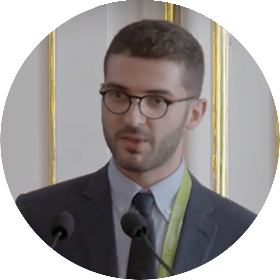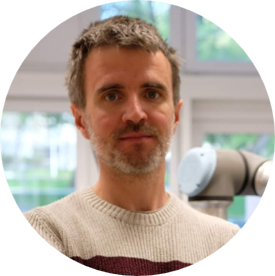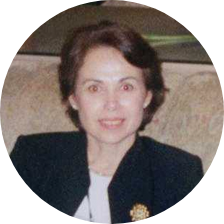Welcome to IMAACA 2025!
Dear Sir/Madam,
innovations and improvements are required to react quickly to the new trends of the global economy. Over the years, Modeling & Simulation (M&S) has proved to be one of the most effective, beneficial and successful methodologies to investigate and study complex systems belonging to various sectors/areas. Nevertheless, to take full advantage of this technology there are relevant issues that keep challenging the researchers towards even more advanced solutions and approaches where emerging and cutting-edge technologies are absorbed into. M&S is widely and successfully applied in many application domains, ranging from industry to social sciences, from logistics to military, from energy to healthcare; in this sense M&S provides a multidisciplinary perspective where theory and data from different fields can be used to build models and simulations that provide insights in to the system considered.
The 2025 International Conference on Integrated Modeling and Analysis in Autonomous Control and Cognitive Agents (IMAACA) will be a platform for knowledge exchange, the review and discussion of theoretical advances, research results, and industrial experiences, among scientists, researchers, decision makers, practitioners and students dealing with the topics under the umbrella of multidisciplinary modeling & simulation.
Therefore, we would like to kindly invite you to take an active part in this conference and in the co-located events that will be held at Fes, Morocco on September 17-19, 2025 and explore with us the latest news, views and developments in the exciting world of multidisciplinary modeling & simulation.
Sincerely,
I3M 2025 Organization Committee

Topics & Tracks
Authors are kindly invited to include in their papers and presentations all the research works, case studies and application both theoretical and applied. Topics of interests include the following topics, however different ones concerning Modeling & Simulation in Industry are welcome.
- Topics
- Digital Transformation towards Autonomous Control and Cognitive Systems
- Advanced Autonomous Control & Self Organizing Systems
- Simulation and Modeling of Cognitive Processes
- Cognitive Architectures and Cognitive Systems
- Artificial Intelligence and Data Analytics
- Industrial Mechatronics and Robotics
- Production and Supply Chain Automation
- Intelligent Intralogistics and Autonomous Warehousing
- Energy Management and Mobility in Autonomous Systems
- Sustainability in autonomous manufacturing systems
- Distributed intelligence and problem solving
- Continual Learning and Adaptive interaction with Cognitive Agents
- Decision-Making in Multi-Agent Systems
- Perception, Multi Sensor Fusion, and Environmental Awareness
- Multi-Agent Communication and Protocols
- Swarm Intelligence and Collective Intelligence
- Ethics, Explainability, and Trust in Human-Agent Interaction
- Human-machine interaction for Autonomous and Cognitive Systems
- Emotional intelligence, Empathic interaction, Affect, and Social Cognition
- Human-Agent Communication and Natural Language Processing
- New Business Models in Autonomous Systems
- Knowledge Management & Strategies for Autonomous Systems
- Memory Systems and Knowledge Representation
- Explainable AI for Business Decision Support
- Self-Learning and Evolutionary Knowledge Management
Tracks
Chair: Adrian Ilinca
Affiliation: Université du Québec, Canada
Track Description: The share increase of renewable sources in hybrid energy systems is an excellent tool to reduce costs and GHG emissions. However, the variability and intermittence of renewable sources require their integration with energy storage and other sources, primarily using fossil fuels. In this context, artificial intelligence is commonly considered a tool for optimizing renewable energy conversion according to resource availability, smart grid strategies, and load management. Therefore, we invite contributions to optimizing hybrid energy systems based on artificial intelligence approaches.
Please be sure to select “Artificial Intelligence to Increase Renewable Share in Hybrid Energy Systems” as main topic during the submission.
Chair: (a)Matías Nacusse, (b)Mourad Benoussaad
Affiliation: (a)Universidad Nacional de Rosario (Argentina), (b) LGP, Laboratoire Génie de Production, ENI Tarbes (France)
Track Description: The increasing complexity of technical systems, that continuously embrace more physical domains and technical areas, along with the stringency imposed on their performance specifications, as well as the desired reduction of production time and costs, altogether call for design solutions that simultaneously integrate the various subfields of engineering involved in their development. Supporting a model-based approach concurrently applied at all design stages, Mechatronics provides the answer to these problems. It brings together, in a coordinated interplay, the knowledge, information and techniques of the different engineering disciplines in order to optimize the development process and the final product. This synergically integrated approach conveys an intrinsic complexity for the system design process. Thus, new concepts, techniques and tools are being looked-for by the community involved in mechatronics R&D. Therefore, we invite the members of this community to submit contributions on these subjects to this special session, as well as on applications in the electromechanical and hydromechanical domains, robotics, manufacturing, automation, etc.
For more information, please contact:
Matías Nacusse, the session organizer, at nacusse@fceia.unr.edu.ar
or, alternatively,
Sergio Junco, the IMAACA general chair, at sjunco@fceia.unr.edu.ar
Please, recall the follwing:
- Only full draft papers are accepted for review.
- Select “Modeling, Simulation And Control System Design Techniques And Tools In Mechatronics” as main topic during the submission.
Submit an Open Track Proposal
Key Dates
Paper Submission Deadlines
- Special Session/Open Track Proposal Closure: May 15th, 2025
- Draft Paper Submission Deadline: April 15th, 2025
- Notification of Acceptance & Review Reports: May 15th, 2025
- Camera-ready Paper Submission Deadline: June 15th, 2025
-
Special Session/Open Track Proposal Closure:
May 15thMay 31st, 2025 -
Draft Paper Submission Deadline:
April 15thMay 31st, 2025 -
Notification of Acceptance & Review Reports:
May 15thJune 15th, 2025 -
Camera-ready Paper Submission Deadline:
June 15thJuly 15th, 2025
Registration Deadlines
- Early Bird Registration Closure: July 1st, 2025
- Late Registration Closure: September 10th, 2025
Committees
IMAACA 2025 Organization Board

Antonio Padovano
IMAACA General Chair
University of Calabria, Italy

Tamás Ruppert
IMAACA Program Chair
University of Pannonia, Hungary

Geneviève Dauphin-Tanguy
IMAACA Honorary Chair
France
IMAACA 2025 Organization Staff
Vittorio Solina – DIMEG, University of Calabria, Italy
Antonio Padovano – University of Calabria, Italy
Letizia Nicoletti – CAL-TEK S.r.l., Italy
Mohaiad Osman Elbasheer – MSC-LES, University of Calabria, Italy
Cataldo Russo – CAL-TEK S.r.l., Italy
Caterina Fusto – MSC-LES, University of Calabria, Italy
Alessandro Chiurco – DIMEG, University of Calabria, Italy
Virginia D’Augusta – DIMEG, University of Calabria, Italy
Simone Talarico – DIMEG, University of Calabria, Italy
Marco Vetrano – CAL-TEK S.r.l., Italy
Kirill Sinelshchikov – Simulation Team, Italy
Antonio Cimino, University of Salento, Italy
Alessio Baratta – MSC-LES, University of Calabria, Italy
Karen Althea Manfredi – MSC-LES, University of Calabria, Italy
Antonio Nervoso – MSC-LES, University of Calabria, Italy
IMAACA 2025 International Program Committee
Kang Taeho – TU-Wien, Austria
Ugljesa Marjanovic – University of Novi Sad, Serbia
Andrey Morozov – University of Stuttgart, Germany
Bartłomiej Gładysz – Warsaw University of Technology, Poland
Vera Varga – University of Pannonia, Hungary
Sandra Mattsson – RISE Research Institutes of Sweden, Sweden
Alex Kummer – University of Pannonia, Hungary
Andrea Salfinger – University of Udine, Italy
Vincenzo Cutrona – SUPSI, Switzerland
Sara Scheffer – TU Wien, Austria
Matías Nacusse – FCEIA, UNR, Argentina
Rachid Outbib – LSIS, Marseille, France
Pushparaj Mani Pathak – IIT, Roorkee, India
Ricardo Pérez Correa – PUC, Chile
Mónica Romero – FCEIA, UNR, Rosario, Argentina
Christophe Sueur – Centrale Lille, France
Armand Toguyeni – Centrale Lille, France
Costas Tzafestas – NTUA, Greece
Jorge Vega – CIESE (UTN-FRSF) and INTEC (CONICET-UNL), Argentina
Daniel Viassolo – Schlumberger, Houston, TX, USA
Belkacem Ould-Bouamama – Polytech Lille, France
Aníbal Zanini – Fac. de Ingeniería, UBA, Argentina
Norberto Nigro – CIMEC, UNL, S. Fe, Argentina
Mourad Benoussaad- ENI Tarbes, France.
Get on board the team now!
Are you willing to join the Organization Committee or the International Program Committee? Discover the benefits and opportunities now and submit your proposal. Please feel free to contact f.longo@unical.it; massei@itim.unige.it
Organized by

For further info, please contact